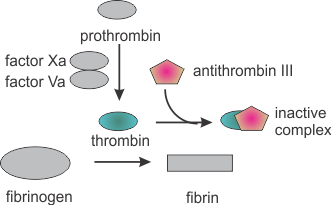
There are several mechanisms that prevent excess clotting.
One of these mechanisms is to inactivate thrombin by forming an irreversible complex with the protein antithrombin III (antithrombin three).
Antithrombin III is a SERPIN (SERine Protease INhibitor). Alpha-1-antitrypsin, a protein that inhibits the serine protease elastase (and also trypsin), is another example of a serpin. You will encounter alpha-1-antitrypsin in a case study later in the semester.

One cause of an increased likelihood of blood clots is a mutation in the gene that encodes antithrombin III.
There are several such mutations that are common in the population.
Heterozygotes with an antithrombin III null mutation (a mutation that results in no protein production from the affected copy of the gene) have half the normal amount of antithrombin III in their blood.
About half of the heterozygotes with an antithrombin III null mutation will develop thrombophlebitis (penetrance is about 50%).